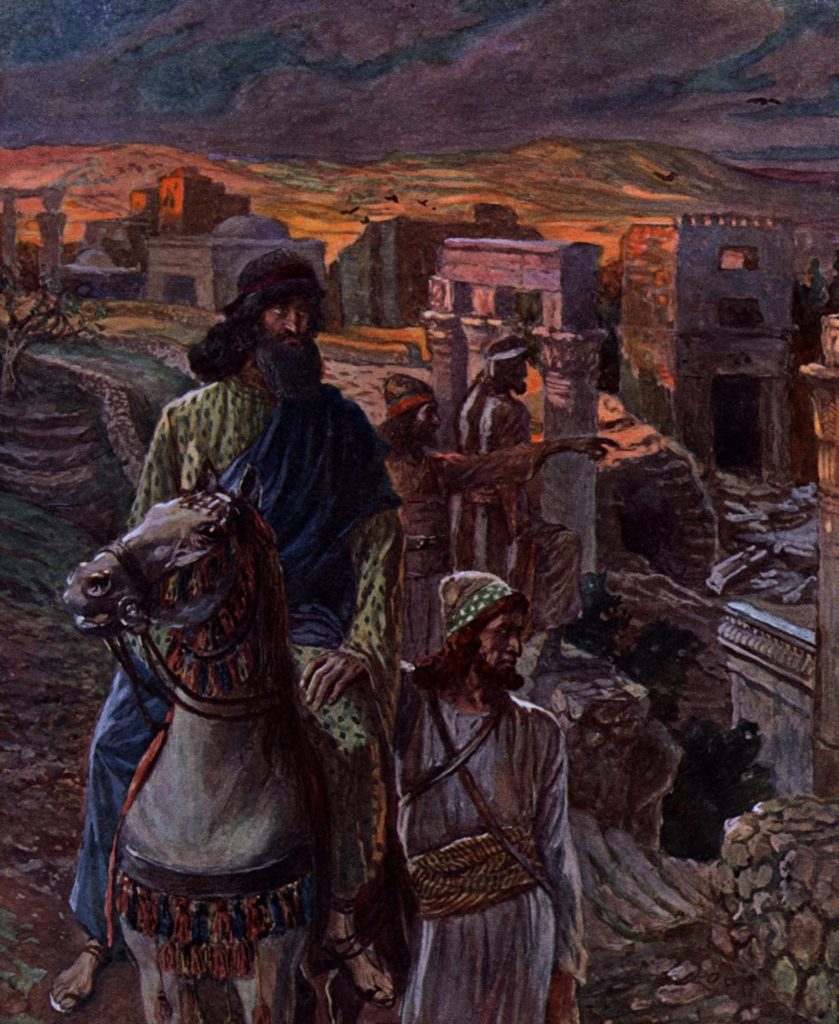Before reading this article, it would be helpful to review quickly the book of Jonah, so that the following will make sense.

- When YHVH gives you some specific and direct marching orders, don’t disobey him no matter how difficult or distasteful they may seem to you. If you disobey, you may not be pleased with the unexpected consequences of your disobedient actions. Jonah found this out the hard way.
- Before pointing our fingers at Jonah for declining the mission YHVH had given him, how many of us have done the same no matter how small or large the assignment?
- When we disobey YHVH (i.e. sin), we take ourselves out of his will for our lives and the result is the loss of peace and tranquility. Sometimes, in an attempt to get our attention and bring us back to him, YHVH brings turmoil and “storms” into our lives to redirect us back to him. If and when this happens, we would do well to ask YHVH for wisdom and understanding as to why we are experiencing what we are (Jas 1:1–8, 12–15).
- When YHVH tells us to do one thing, and we want to do something else, we, at this time, Scripture instructs us to bring every thought of ours (that is not of YHVH) captive into obedient compliance to our Messiah (2 Cor 10:5).
- When we rebel against fulfilling a divine mission, YHVH will pursue us to get us back in line with his perfect will for our lives.
- Sin and rebellion puts us into a spiritual state of sleep, so that we’re oblivious to the consequences of our actions upon us and those around us. When this happens, we come under spiritual delusion in thinking that we are doing the will when, in reality, we are walking in accordance with our own mind, will and emotions as dictated by the world, the flesh and devil (Eph 2:1–3; Jas 3:15).
- We cannot hide or run away from our sin and rebellion. It will be exposed, even if YHVH has to use heathens and strange circumstances to do so.
- Only when we humbly confess our sins and repent will the “storms” of YHVH’s judgment cease and the sea of life made calm in our lives.
- Jonah, to his credit, owned his sin and took full personal responsibility for it without blaming others or making excuses. He didn’t want others to suffer for his folly. He was willing to accept the consequences of his sin. Because of this, YHVH showed him favor, prepared a fish to swallow him, and then gave Jonah three days in the fish’s belly to ponder his errant ways.
- When in a place of trouble and distress, Jonah prayed and expressed his faith in YHVH. When facing distresses in our own lives, how often do we fail to cry out humbly to our merciful Father in heaven?
- The eyes of YHVH are on the righteous, and his ears are open to their cry. (Ps 34:15)
- The righteous cry out, and YHVH hears, and delivers them out of all their troubles. YHVH is near to those who have a broken heart, and saves such as have a contrite spirit. Many are the afflictions of the righteous, but YHVH delivers him out of them all. (Ps 34:17–19)
- We should be ready and willing to pray anywhere at anytime. Jonah prayed in the belly of a fish. What excuse do we have for not praying no matter when or where we may find ourselves in our time of distress?
- Jonah was a spiritual backslider, yet he repented and YHVH heard and accepted his prayer. Jonah’s example should be an encouragement to any backslider no matter how grave the sins he has committed against the Creator.
- As Jonah’s three-day tenure in the fish’s belly was prophetic of Yeshua’s time in the grave, so Jonah’s “resurrection” from the depths of the sea points to the resurrection of our Messiah as Yeshua himself so declares in Matthew 12:40. Jonah’s faith in the Creator along with his “death” and “resurrection” points sinners to the Messiah who alone can save us from the sting of sin which is death. Our only hope of victory over death and the grave is through Messiah and the resurrection from the dead he promises to those who are his.
- Upon repenting of his backsliding and being mercifully delivered from certain death, Jonah humbly submitted to YHVH’s mission to preach repentance to the people of Nineveh. Jonah had to repent of his own sin before he was meat for the Master’s use. Jonah accepted the yoke of his mission, and fulfilled his mission with great boldness. Similarly, when YHVH gives us a mission, we must be bold to fulfill it faithfully and without hesitation. We must be willing to go when, where and to whom he tells us. We must faithfully do exactly as he has commissioned us, to proclaim what he has commanded us and nothing more or less.
- When YHVH gives you a prophetic word for someone, don’t let your personal emotions cloud your perspective. Don’t forget that you’re merely YHVH’s spiritual mailman who is delivering his mail, not yours. Period. Jonah let his anger for Nineveh (Israel’s mortal enemy) cloud his judgment.
- A prophet must accept his divine mission without any preconditioned biases against the message’s recipient, and he must remain as emotionally neutral and unbiased as possible. He should focus only on fulfilling his mission as YHVH wishes and remain impartial and personally emotionally detached, so as not to pollute the purity of the divine message.
- No matter how many miraculous things YHVH does in a prophet’s life, and no matter the magnitude of the message, the greatness of the recipient of the prophetic word, or the importance of the mission, a prophet needs to stay humble (small in his own eyes) before YHVH.
- Prophetic words of judgment are always conditional upon the recipient’s response. If they refuse to repent, the word will come to pass. If they repent, YHVH will relent and the judgment will pass.
- The Ninevites wholeheartedly fasted, prayed and repented of their sin, and YHVH in his mercy spared them. This is the key to averting YHVH’s well-deserved judgment upon individual sinners and a sinful nation.
- Don’t wish harm on others no matter how evil you think they are or how much you think they deserve YHVH’s judgment. At all times, orientate your heart and thoughts to that of the Father. He is merciful, gracious, patient and longsuffering and so should we be. When repentance occurs, his mercy triumphs over his judgment.
- Don’t wish judgment or destruction on your enemies. If you do, YHVH might spare your enemies and bring judgment on you just to teach you humility. We all deserve YHVH’s judgment, and were it not for his merciful grace, where would any of us be? Instead, we must seek the well-being of our enemies through their repentance and salvation. The missionary of YHVH must pursue his divinely inspired endeavors with a heart of love and mercy that overshadows any personal feelings he may have to the contrary. This is getting in tune with and acting out the heart of our Heavenly Father.
- Jonah, in not being pleased over the Ninevites’ repentance and YHVH sparing them judgment, evidenced his own self-righteous pride toward the heathens. After all, YHVH had miraculously and mercifully delivered him when he was a backslidden sinner. For Jonah not to show the same grace to the Ninevites that YHVH had shown to him was a manifestation of prideful hypocrisy. We must be quick to extend the same mercy and grace to others that YHVH has shown to us. After all, YHVH loved us all while we were yet sinners (Rom 5:8)!
- The conversion of sinners should bring the saint great joy, not sullen anger as occurred with Jonah. In this situation, he manifested a despicably carnal and rotten attitude!
- There are few things as repugnant as a saint who falls prey to his base and carnal passions. In this case, Jonah was acting like pouting, puerile prophet who instead of being joyful at the salvation of sinners wished ill on them. Yeshua declares that the angels in heaven rejoice at the salvation of one lost sinner, yet all Jonah could do was to manifest a vindictive spirit.
- Jonah was a conflicted prophet who spewed both sweet and bitter waters from his mouth. He was a true prophet of Elohim who manifested some truly noble and saintly character traits, to be sure, but he was conflicted in that he had not conquered some of his most carnal and base passions. Such prophets are a liability to the kingdom of Elohim. When in tune with YHVH’s Spirit, they are capable of much good, but when under the control of their own perverse, moody and sinful nature, they are perhaps a greater liability to the kingdom of heaven then they are an asset to it.





